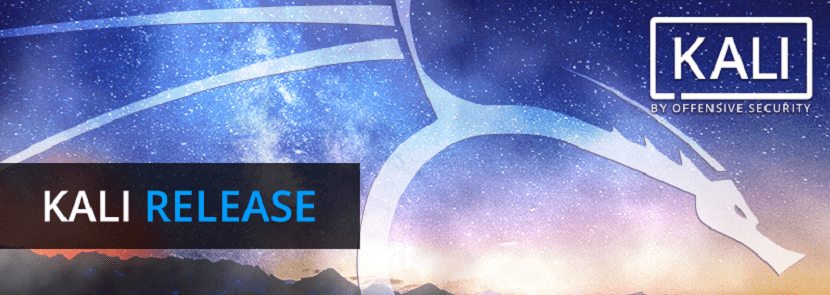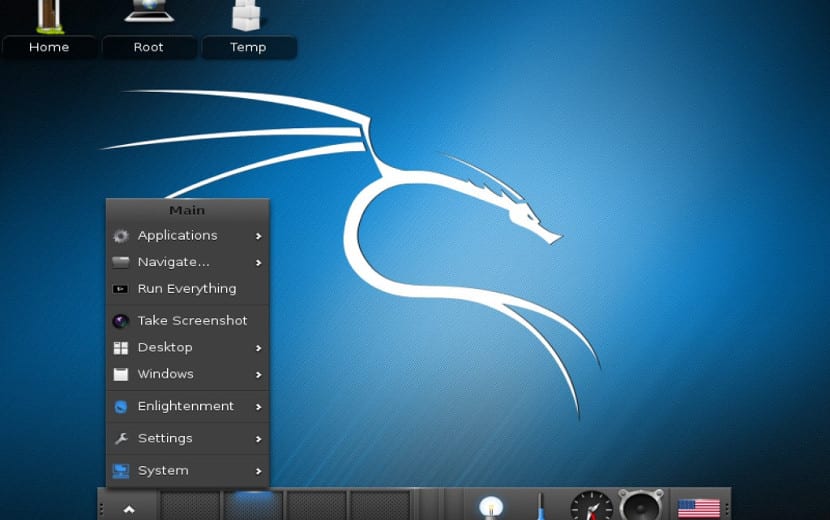
Some days ago the guys from Offensive Security unveiled the new version of their Kali Linux operating system which comes with new tools, bug fixes and also system security fixes.
Formerly known as BackTrack Linux Kali Linux is a Debian-based penetration testing operating system, which offers the latest in Linux and up-to-date component technologies.
Kali Linux is a distribution that is practically a security testing platform, which can be used as a Live CD.
It is available in 32-bit, 64-bit, with variants for ARM, as well as specific builds to many popular hardware platforms, among which we can highlight the Raspberry Pi.
Includes over 300 penetration testing tools, in which FHS, is compatible with a wide range of wireless devices, comes with a custom Linux kernel patched for packet injection, supports multiple languages and is fully customizable.
What's new in the new release of Kali Linux 2018.3
This new release of the Kali Linux 2018.3 operating system brings the new Linux kernel in version 4.17.0.
While they didn't introduce many changes from the past 4.16.0 kernel it had a huge number of additions and improvements that includes more new security fixes against Specter, power management improvements, and better GPU support.
Within the novelties that can be highlighted in this launch can be found the introduction of the IDB, a tool for research and penetration testing on iOS.
This tool is one of the coolest new features in Kali Linux 2018.3 that hackers or bug hunters can be used for research and penetration testing on Apple's iOS mobile operating system.
Other new features that can be found are the Kerberoast Kerberos evaluation tools and the DataSploit OSINT framework to perform various recognition operations.
There are also new tools and updates of the tools that already exist within the system.
Within The new features that can be highlighted in this new launch of the system are:
- BID - BID is a tool to simplify some common tasks for iOS application security assessments and investigation.
- GDB-peda - Python Exploit Development Aids for BGF that enhance the visualization of GDB: Disassembly display codes, registers, memory information during debugging
- datasploit - A #OSINT framework to perform various recognition techniques on companies, people, phone numbers, Bitcoin addresses, etc., all raw data is added and this data can be given multiple formats.
- kerberoast - Kerberoast is a series of tools to attack Kerberos MS implementations.
In addition to these new packages, a number of tools within the repositories were also improved including aircrack-ng, burpsuite, openvas, wifite, and wpscan.
Download Kali Linux 2018.3

Si want to get this latest release of Kali Linux 2018.3is you can find download links of the different ISO images and torrents on the Kali download page along with links to virtual machines and ARM images, which have also been updated to this new 2018.3 version.
If you already have a Kali Linux installation and want to get this new update, there is no need to do a new installation.
Just open your terminal and run the following commands in it to update to this new version of the system.
apt update && apt -y full-upgrade
With that they will have to wait for all the updates to be downloaded and installed in the system.
At the end of this process, it is recommended that you restart your computers so that all new changes are loaded at startup along with the new system kernel.
For check that the system version is the most current, first make sure your Kali package repositories are correct.
cat/etc/apt/sources.list deb http://http.kali.org/kali kali-rodando main contrib non-free
Y then just run the following command to check the current version installed.
grep VERSION /etc/os-release VERSION="2018.3" VERSION_ID="2018.3"
4good afternoon,
I have installed kali 2017.1 with the corresponding kernel 4.9.0 and I cannot install the new 2018.3.
When I run to update it, it answers the following:
apt update && apt -y full-upgrade
Reading package list ... Done
Creating dependency tree
Reading the status information ... Done
All packages are up to date.
Reading package list ... Done
Creating dependency tree
Reading the status information ... Done
Calculating the update ... Done
0 updated, 0 new will be installed, 0 to remove, and 0 not updated.
The version that the machine has is as I mention the following:
grep VERSION / etc / os-release
VERSION = »2017.1 ″
VERSION_ID = »2017.1 ″
uname -a
Linux kali 4.9.0-kali4-686-pae # 1 SMP Debian 4.9.25-1kali1 (2017-05-04) i686 GNU / Linux
I'm a newbie to the Linux world, but let's see if you can help me,
Greetings!
Greetings friend Dexter, excuse me, I am not the answer you expected.
Because you claim to be new to the linux world, I only have a week on this.
Can you help me?
If you are asking for help, and I answer I asking you for help.
hahahahahahaha that's life.
I would appreciate your response.
hello everyone ... download and install the 2018.3 version and add the repository as is, but what happens is that when you finish updating all you had is Desktop disappears as well as the copy paste functions and that of the secondary button function My mouse ... I have not found anything about this failure or I do not know if it is a failure ... do you know something about this ,,, help and in advance thanks
Good night trying to update kali linux 2018.3 always throws me a window that no longer allows me to do anything else that says the following ...
postgresql-cammon configuration
Major version 10 obsolete asks to update to postgreql 11 and postgresq client 11 but does not allow doing anything using a terminal to install it tells me that / var / lib / dpkg / lock-frontend - open could not be locked (11: Resource temporarily unavailable )
How can I solve this problem please since Kali does not allow you to install anything and only the same thing comes out, I would appreciate your help